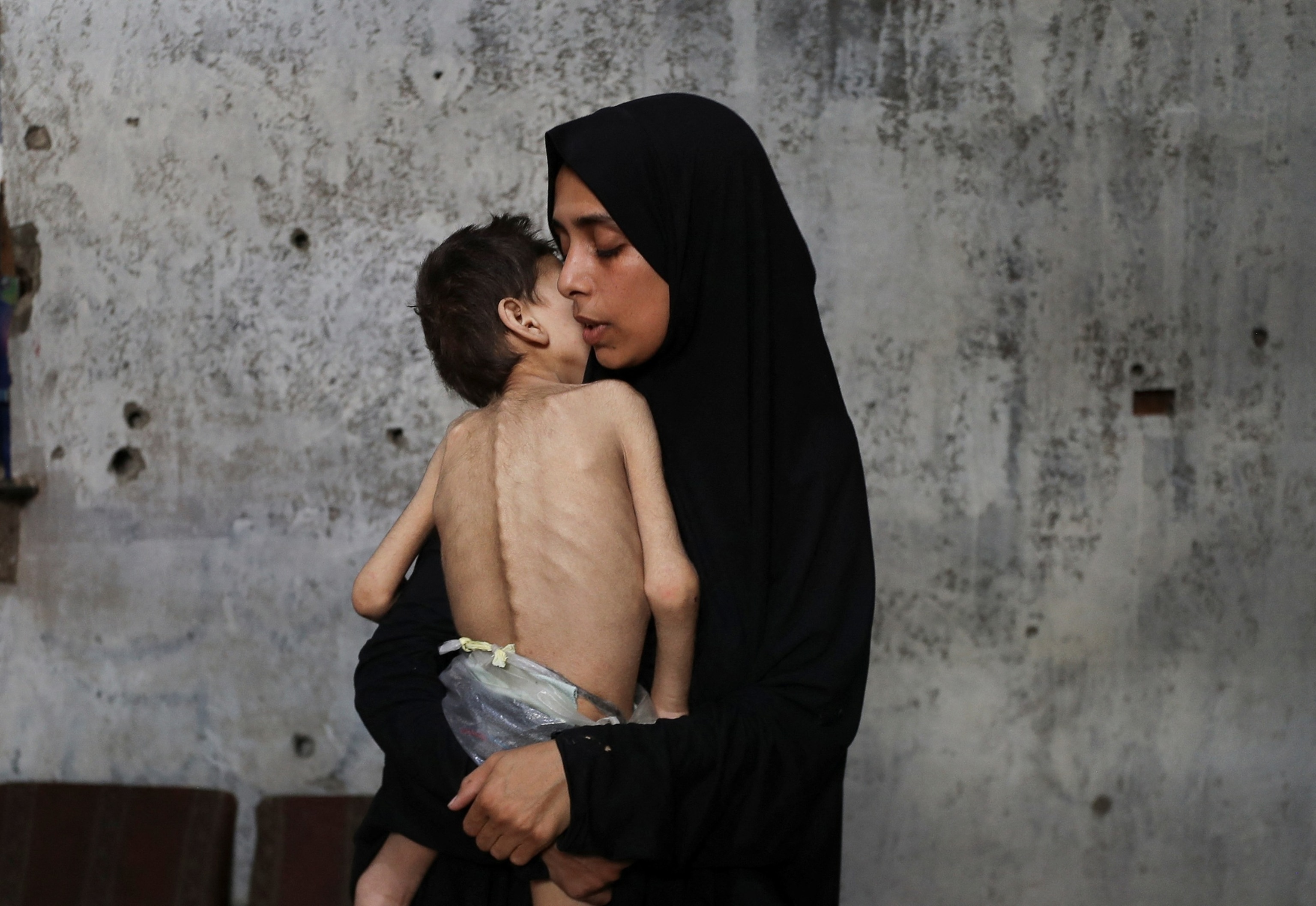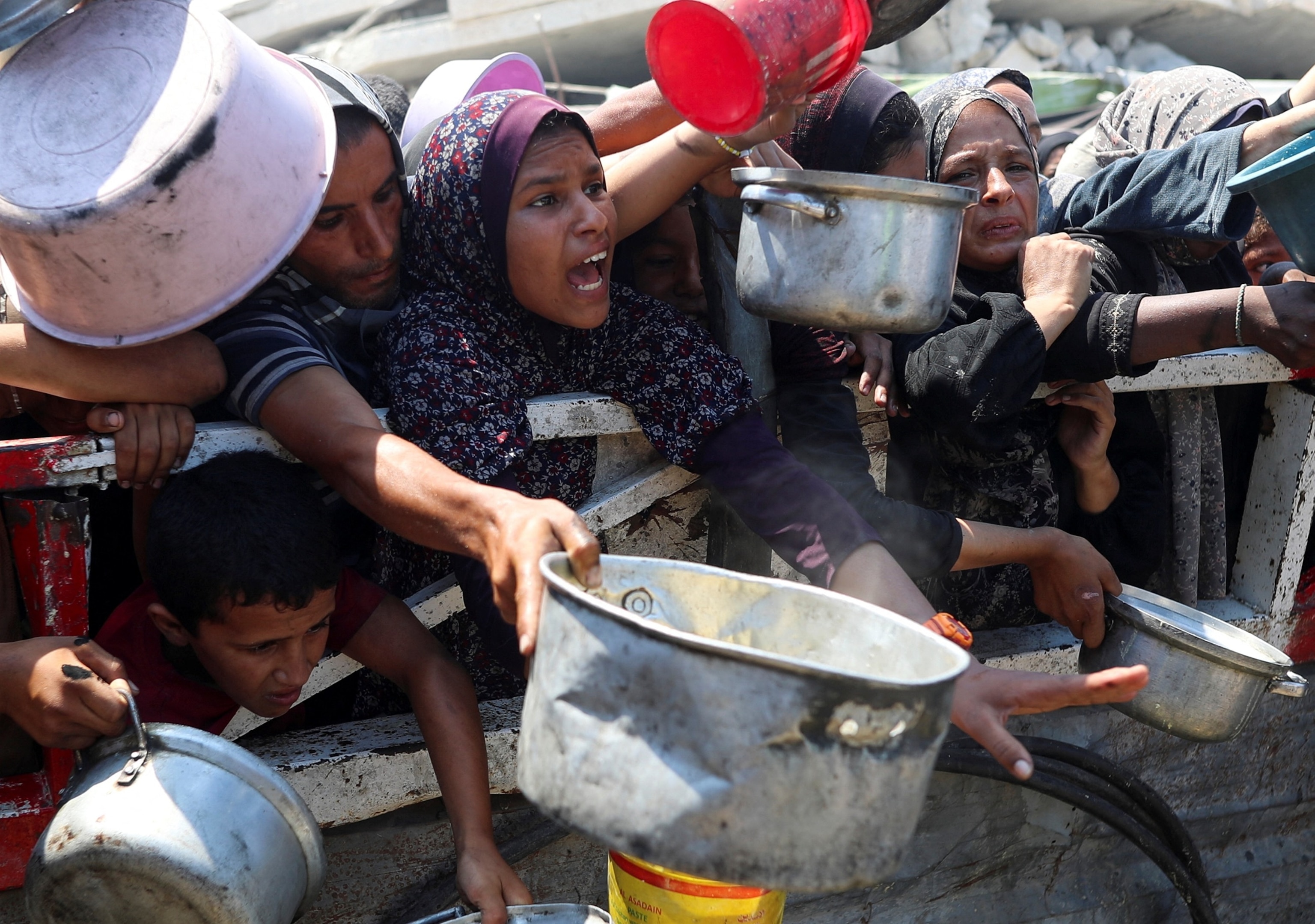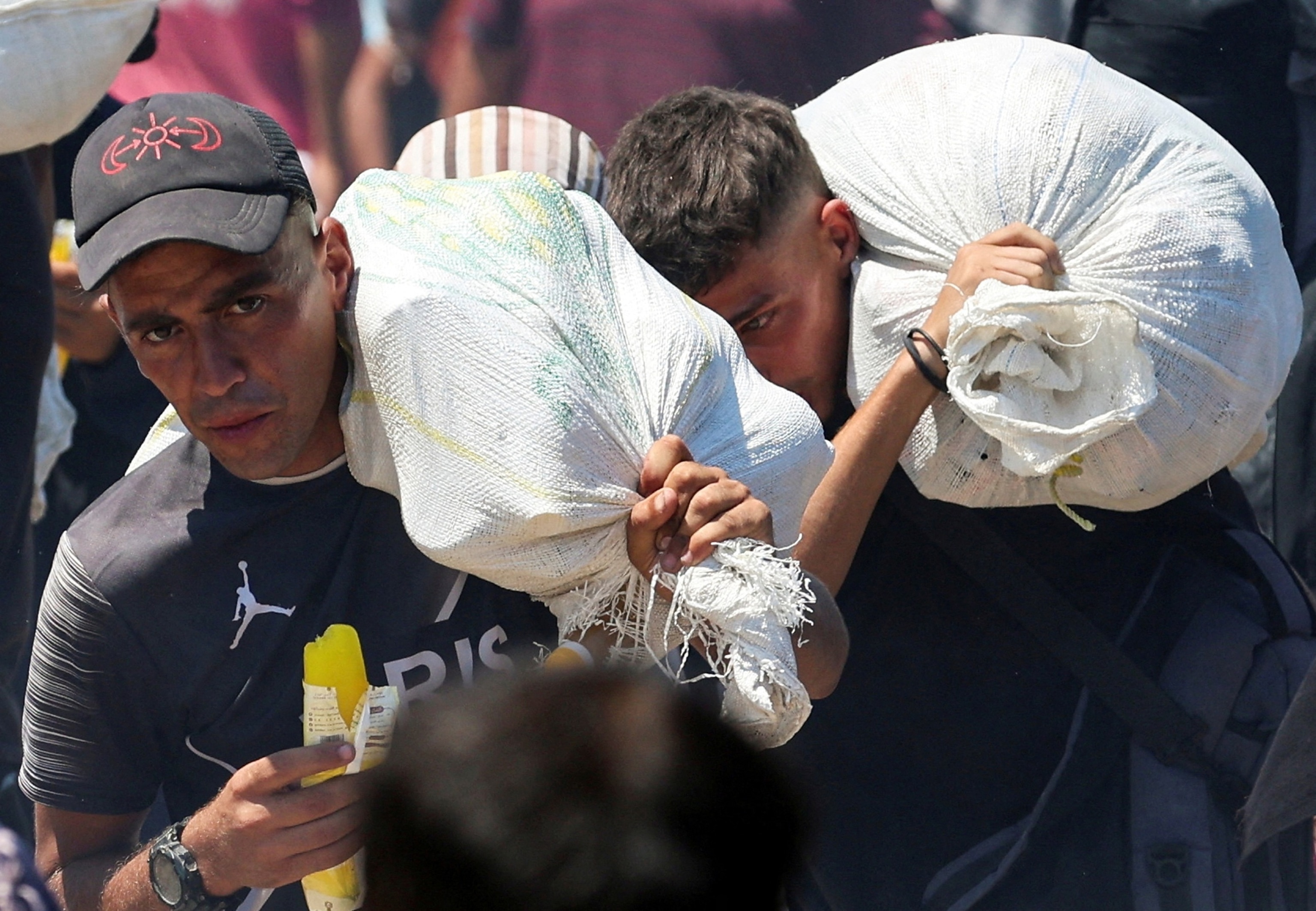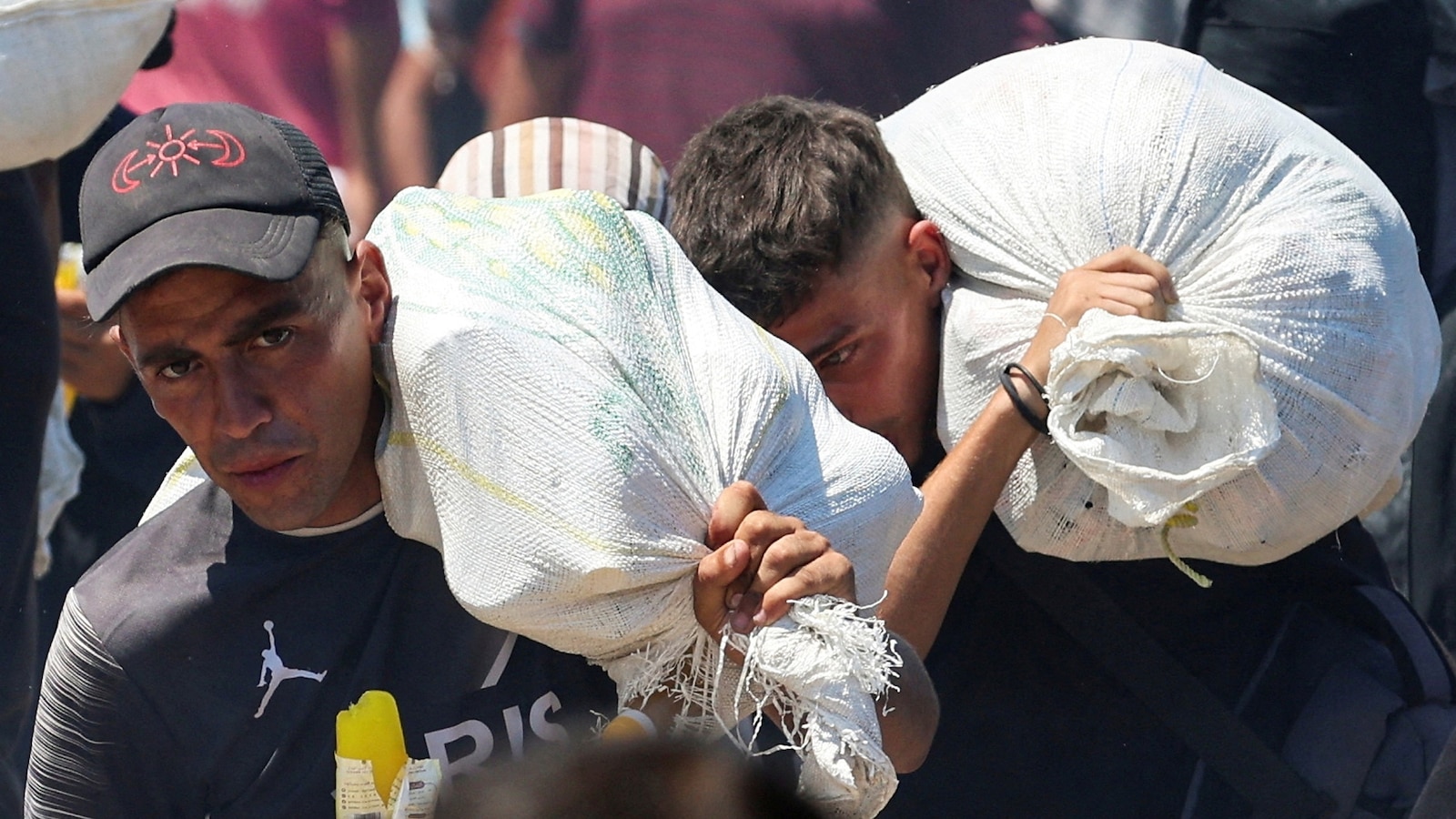Doctors and aid workers inside Gaza are reporting grim and heartbreaking details of widespread malnutrition, particularly in children, as the hunger crisis reportedly continues to worsen amid the Israel-Hamas war.
The Hamas-run Gaza Ministry of Health said on Thursday that 27 people have died of hunger over the last three days, bringing the total to 113 since the war began on Oct. 7, 2023. Of the total deaths due to hunger, 81 have been children, according to the Health Ministry.
MercyCorps, an aid organization that provides humanitarian services as well as a hotline for psychosocial support in Gaza, said it has received testimony from parents struggling to provide food for their children.
“This is one: ‘Last night, I was thinking about killing my children because I can’t take proper care of them or raise them in a good way,'” the group relayed to ABC News. “‘I can’t even provide food. I had to send them to neighboring tents to beg for bread to feed. I truly don’t know what to do anymore.'”
Abdulwhhab Abu Alamrain — a volunteer at Al-Aqsa Martyrs Hospital in central Gaza and a worker with the medical data department at Médecins Sans Frontières (MSF), or Doctors Without Borders — said there are only four stabilization centers for malnutrition in Gaza and the admission capacity is severely limited due to the overcrowding of facilities.

Displaced Palestinian mother Samah Matar holds her malnourished son Youssef, who suffers from cerebral palsy, at a school where they shelter amid a hunger crisis, in Gaza City, July 24, 2025.
Mahmoud Issa/Reuters
He said the emergency departments of hospitals in Gaza have been overwhelmed with injuries since the war began. However, over the last two weeks, they have been overwhelmed with people reportedly injured while trying to get aid, along with people collapsing from hunger.
“A kid came to our house like two days ago begging for something to eat, a piece of bread,” Alamrain told ABC News. “We don’t have any. We gave him from our lunch, [a] cup of chickpeas. … Life feels dystopian recently.”
On Thursday, MSF said 25% of children and pregnant or breastfeeding women screened at clinics in Gaza are malnourished, and cases of severe malnutrition in children under the age of 5 have tripled in just two weeks.
Caroline Willemen, MSF project coordinator in Gaza City, said that on July 19 and 20 at Al-Helou Hospital in northern Gaza, MSF medical teams could not provide food to women and children in the pediatric and maternity wards and there wasn’t enough baby formula for the 23 babies in the neonatal intensive care unit.
On July 20 and July 21 at Nasser Hospital in central Gaza, 168 patients admitted to the pediatric and maternity wards could not access food, she said.
Additionally, Edouard Beigbede, the UNICEF regional director for the Middle East and North Africa, said on Thursday that over two weeks in July, 5,000 children were admitted to their clinics with acute malnutrition and, in Gaza City alone, the number of children screened and detected with acute malnutrition is four times higher than what it was in February.
Dr. Zaher Sahloul, president of MedGlobal, told ABC News that 19 children have recently been admitted to the non-profit’s clinics in Gaza suffering from severe acute malnutrition, which is a number the organization has never seen.
Five of those children, between three months and 4.5 years old, died over the last 72 hours, as of Wednesday, Sahloul said.
“This is an emergency because up to 50% of children with severe acute malnutrition can die,” Sahloul told ABC News. “Without a dramatic increase in the amount of aid entering, more children will die.”

Palestinians wait to receive food from a charity kitchen, amid a hunger crisis, in Gaza City, July 23, 2025.
Mahmoud Issa/Reuters
Kate Phillips-Barasso, vice president of global policy and advocacy at MercyCorps, said her team on the ground in Gaza is reporting many people going days at a time without eating at all.
“Everyone is spending their day in pursuit of how they’re going to feed themselves,” she told ABC News. “They’re losing hope. They’re wondering if they or their families will come on the other side alive.”
MercyCorps was one of more than 100 aid groups that put out a joint statement this week warning of “mass starvation” in Gaza.
“We feel like we’re tipping over that precipice where more people are going to die,” Phillips-Barasso continued. “We’re already starting to hear reports of more children dying. That is coming, and when it tips over, it is really hard to put that in reverse. It’s getting to a point where they need therapeutic feeding and treatment, not just more food supplies. This is going to start to snowball and be very hard to walk that back.”
Aid organizations said their workers and medical staff are also struggling to get food.
MSF said its staff is treating patients for hunger while struggling to feed themselves and their families as they enroll 25 new malnutrition cases every day in Gaza City alone.
Alamrain told ABC News he has lost 27 kilograms (59.5 pounds) since the war began in October 2023, and eight kilograms (17.6 pounds) in the last two months.
Recently, his family baked its last 0.5 kilograms (1 pound) of flour to make seven pieces of bread, he said. Although his family does have money to spend, the markets have run out of food.
Over the last week, Alamrain said he has consumed between 700 and 1,400 calories per day, even though his recommended number of calories per day sits at 2,500.

Palestinians seeking aid from the U.S.-backed Gaza Humanitarian Foundation carry bags, near Rafah, in the southern Gaza Strip, July 24, 2025.
Ramadan Abed/Reuters
“These days are like the worst of the whole war in terms of food insecurity. We are not hungry [because] we are poor. We are hungry because there is not food to buy, or if there is, it is like [a] crazy price,” he said. “There is like mass feeling of dizziness of people due to hunger.”
The Israeli government has denied that it is limiting the amount of aid entering Gaza and has claimed Hamas steals aid meant for civilians. Hamas has denied these claims.
An Israeli security official said this week that 950 humanitarian aid trucks are waiting at crossings, pending collection and distribution by United Nations agencies.
David Mencer, a government spokesperson, told ABC News on Thursday that there is “no famine caused by Israel, but there is a man-made shortage which has been engineered by Hamas.”
Similarly, on Thursday, State Department deputy spokesperson Tommy Pigott denied that Israel — or the U.S. by extension — is weaponizing humanitarian aid.
“This humanitarian conflict lies at the feet of Hamas, who could end this conflict today by releasing the hostages and laying down their arms,” he said.
(Except for the headline, this story has not been edited by PostX News and is published from a syndicated feed.)

